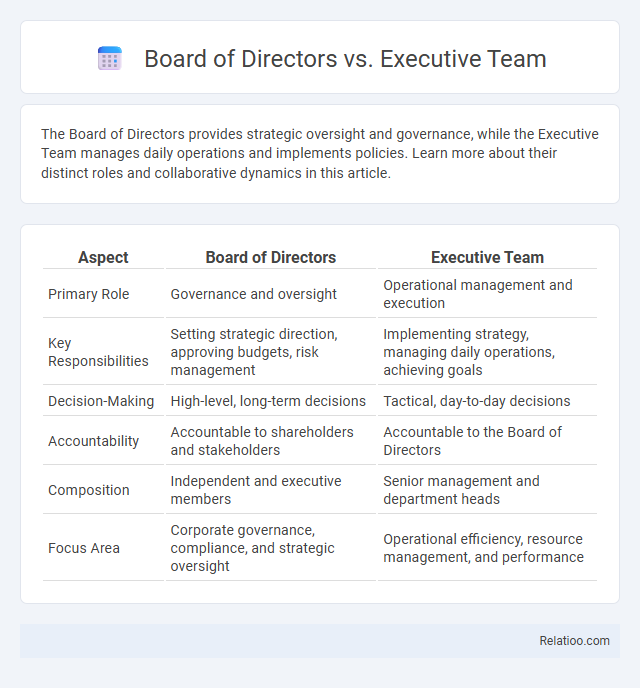The Board of Directors provides strategic oversight and governance, while the Executive Team manages daily operations and implements policies. Learn more about their distinct roles and collaborative dynamics in this article.
Table of Comparison
| Aspect | Board of Directors | Executive Team |
|---|---|---|
| Primary Role | Governance and oversight | Operational management and execution |
| Key Responsibilities | Setting strategic direction, approving budgets, risk management | Implementing strategy, managing daily operations, achieving goals |
| Decision-Making | High-level, long-term decisions | Tactical, day-to-day decisions |
| Accountability | Accountable to shareholders and stakeholders | Accountable to the Board of Directors |
| Composition | Independent and executive members | Senior management and department heads |
| Focus Area | Corporate governance, compliance, and strategic oversight | Operational efficiency, resource management, and performance |
Introduction to Board of Directors and Executive Team
The Board of Directors provides strategic oversight and governance, ensuring the company adheres to its mission and regulatory requirements. The Executive Team, led by the CEO, manages daily operations and implements the Board's policies to achieve business objectives. Your understanding of these roles clarifies how decision-making authority is distributed within a corporation.
Defining the Board of Directors
The Board of Directors is a group of elected individuals responsible for overseeing the strategic direction and governance of a company, ensuring accountability to shareholders. Unlike the Executive Team, which handles day-to-day operations, the Board sets policies, approves budgets, and appoints key executives. Decision-makers can include both the Board and executives, but the Board holds ultimate authority on major corporate decisions and long-term strategies.
Defining the Executive Team
The Executive Team consists of top-level managers responsible for implementing strategies and managing daily operations within a company, distinct from the Board of Directors who provide oversight and governance. Your Executive Team drives business performance by translating the board's vision into actionable plans, coordinating departments, and leading key initiatives. Decision-makers may include members from both groups, but the Executive Team primarily handles operational decision-making to achieve organizational objectives.
Key Roles and Responsibilities
The Board of Directors primarily oversees corporate governance, sets strategic direction, and ensures accountability by monitoring executive performance. The Executive Team handles day-to-day operations, implements the board's strategy, and manages departmental functions to achieve business objectives. Decision-makers, which can include both board members and executives, are responsible for making critical choices that impact the company's growth, risk management, and resource allocation.
Structural Differences
The Board of Directors governs Your company's overall direction and policies, holding legal accountability but typically not engaging in daily operations. The Executive Team manages day-to-day business activities, implementing strategies approved by the board and overseeing operational functions. Decision-makers may span both groups but primarily refer to executives who make tactical decisions, while the board focuses on high-level, strategic choices rooted in governance and long-term objectives.
Decision-Making Authority
The Board of Directors holds the highest decision-making authority, setting overall company strategy and approving major policies that guide the organization's direction. The Executive Team, including CEOs and senior managers, implements these strategies and manages day-to-day operations, exercising operational decision-making within the framework set by the board. Your company benefits when clear roles delineate decision-making authority, ensuring that strategic oversight and operational execution align effectively.
Interaction and Collaboration
The Board of Directors provides strategic oversight and governance, setting broad policies while the Executive Team handles day-to-day operations and tactical execution. Effective interaction between the Board and Executive Team ensures alignment on organizational goals, with clear communication channels fostering accountability and informed decision-making. Your ability to facilitate collaboration among these groups directly impacts the quality and speed of critical decisions driving company success.
Accountability and Reporting Lines
The Board of Directors holds ultimate accountability for corporate governance and sets strategic direction, overseeing the Executive Team responsible for day-to-day management and operational decisions. Executive Team members report directly to the Board, ensuring transparent communication and alignment with overall objectives. Your role as a Decision-maker involves executing specific initiatives within these reporting lines while maintaining responsibility for outcomes and adhering to established accountability structures.
Impact on Organizational Governance
The Board of Directors establishes strategic oversight and ensures accountability, significantly shaping organizational governance by setting policies and monitoring executive performance. The Executive Team implements board directives and manages daily operations, directly influencing governance through operational decisions and resource allocation. Decision-makers at various levels consolidate input from the board and executives, driving timely and effective governance outcomes that align with organizational goals.
Choosing the Right Balance
Choosing the right balance between your Board of Directors, Executive Team, and Decision-makers is crucial for effective governance and operational success. The Board of Directors provides strategic oversight and risk management, while the Executive Team handles day-to-day management and execution of organizational goals. Your decision-makers, whether part of the Board or Executive Team, must align authority and accountability to drive sustainable growth and ensure well-informed, timely decisions.

Infographic: Board of Directors vs Executive Team
 relatioo.com
relatioo.com